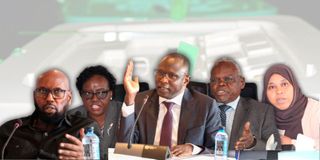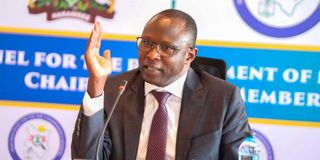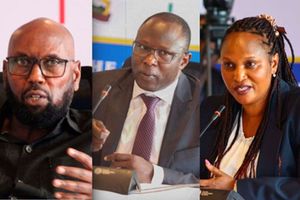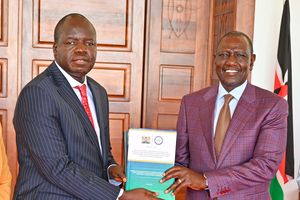
Erastus Edung Ethekon (center) and other nominees for IEBC commissioners (from left) Hassan Noor Hassan, Mary Karen Sorobit, Francis Odhiambo Aduol and Fahima Araphat Abdallah.
Senators and members of the National Assembly are set for a major clash over the vetting of the Independent Electoral and Boundaries Commission (IEBC) nominees ahead of next week's approval hearing.
The development comes after the senators took issue with their exclusion from the upcoming exercise, with only MPs having the bragging rights.
The senators are demanding that the National Assembly withdraw a public notice inviting Kenyans to submit memoranda on the nominees, terming it illegitimate without Senate's participation.
They argue that the reconstitution of the IEBC is a matter of national significance—spanning both levels of government—and must therefore involve both Houses of Parliament, a move that could re-ignite the long-standing supremacy battles between the two Houses of Parliament.
The National Assembly’s Departmental Committee on Justice and Legal Affairs is set to begin the approval hearing of the IEBC chairperson nominee Erastus Ethekon and six other commissioner nominees on May 27, 2025, to the exclusion of the Senate.
The exclusion has drawn the ire of the senators who now contend that the process should be undertaken jointly by both Houses, as has been the practice with the approval of nominations to key state offices.

IEBC chairperson Erastus Edung Ethekon.
Senate Justice and Legal Affairs Committee chairperson Hillary Sigei cited precedent where in previous vetting exercises—including for State officers like the Inspector-General of Police, Central Bank Governor, and members of the Commission on Revenue Allocation—both Houses have participated through joint committees.
Currently, Article 250(2) of the Constitution and the IEBC Act state that IEBC nominees are to be vetted by the National Assembly.
The provision states that the National Assembly shall, upon receipt of the names of the nominees, consider them and—approve one of the nominees; or reject both of the nominees.
However, Mr Sigei argued that the provision was amended in 2012—before the Senate was formally constituted—and only intended to apply to the first general elections following the promulgation of the Constitution in 2010.
“In our considered view, this is a process that should be undertaken jointly by both Houses, as has been the practice with the approval of nominations to key state offices,” Mr Sigei said.
“This amendment, which replaced the word ‘Parliament’ with ‘National Assembly,’ was meant to apply only to the transitional phase. Since then, the National Assembly has consistently frustrated our efforts to restore the term ‘Parliament’ in the law,” added the Bomet senator.
The senator added that a proposed amendment by the Senate to reintroduce the term is still pending in the National Assembly.
“Indeed, this is one of the Bills that the National Assembly has kept on its shelves far longer than is acceptable. Let me state categorically that, as a committee and as a House, we will not back down on this provision," he said.
Busia Senator Okiya Omtatah echoed his counterpart's sentiments, arguing that although Article 250(2) may appear to sideline the Senate, the Constitution must be read holistically.

Busia Senator Okiya Omtatah.
He observed that the Constitution is clear that matters of devolution require the Senate’s involvement.
"IEBC commissioners preside over the elections of senators, governors, and MCAs—offices which are central to county governments and devolved structures,” said Mr Omtatah.
“I fully support the position that reading the Constitution in its entirety necessitates bringing those names before the Senate for approval," he added.
President William Ruto, apart from Mr Ethekon, named Registrar of Political Parties Ann Nderitu, Moses Mukhwana, Mary Karen Sorobit, Hassan Noor Hassan, Francis Odhiambo Aduol and Fahima Araphat Abdallah as commissioners.
He later submitted the names to the National Assembly for consideration and approval by Parliament.
“His Excellency the President has urged the National Assembly to prioritise the consideration of these nominations,” said Head of Public Service Mr Felix Koskei.
In a notice issued on Monday last week, National Assembly Clerk Samuel Njoroge announced that the Departmental Committee on Justice and Constitutional Affairs will conduct the approval hearings in accordance with Article 118(1)(b) of the Constitution and the Public Appointments (Parliamentary Approval) Act.
The notice gave Kenyans until Wednesday this week to submit sworn statements and supporting documents challenging the suitability of the seven nominees ahead of the vetting.
According to parliamentary rules, the vetting committee must complete the process within 21 days after receiving the names, as provided for in the IEBC Act, 2011. The full House is required to consider the final report within 28 days.
Nandi Senator Samson Cherargei called for the vetting to be conducted by a joint committee of both Houses.

Nandi Senator Samson Cherargei.
“Even when you read Article 88 on the establishment of the IEBC, there is no justification for the National Assembly to vet the commissioners alone,” Senator Cherargei said.
Nyamira Senator Okong’o Omogeni decried how the mutilation of the Senate’s oversight and legislative authority was engineered during the Constitution-making process in Naivasha, pointing accusing fingers at the MPs.
“The current law, as drafted, locks the Senate out of a process that directly affects the institution,” Mr Omogeni said.
Once approved, the new IEBC team will take over the commission’s leadership and play a central role in managing upcoming by-elections and preparing for the 2027 General Election.
The six-year non-renewable term of Mr Chebukati and two commissioners—Mr Boya Molu and Abdi Guliye—ended in January 2023.
Three other commissioners—Vice-Chairperson Juliana Cherera, Justus Nyangaya and Francis Wanderi—opted to resign rather than face a tribunal that was established to investigate their conduct immediately after the August 9, 2022, General Election.
However, Ms Irene Masit, who opted to face the tribunal, was removed by President Ruto following the recommendation of the tribunal.
The country has been without an electoral body since President Ruto declared the seven positions vacant on February 14, 2023 and March 1, 2023.
The process to reconstitute the Commission began on March 1, 2023 but soon ran into headwinds, facing a nearly two-year delay before resuming on January 27, 2025, when President Ruto appointed a new seven-member panel to oversee the recruitment.
The delayed reconstitution of the commission has seen constitutional requirements of delimitation of electoral boundaries and by-election in various electoral areas delayed, thus violating the supreme law.
Mr Johan Kriegler, the South African retired judge who chaired the Independent Review Commission on the 2007 elections, recommended that IEBC commissioners must be in office at least two years before a general election.
Other than conducting the 2027 General Election, the reconstituted commission is required to undertake the delayed electoral boundaries delimitation and various by-elections.
Among the constituencies that have no MPs are Banissa, which was left vacant after MP Hassan Kullow died in a road accident on March 29, 2023. There is also Magarini, which fell vacant after the Supreme Court on May 31, 2024, upheld the nullification of the election of Mr Harrison Kombe.
The appointment to Cabinet of former Ugunja MP Opiyo Wandayi and Mbeere North MP Geoffrey Ruku has necessitated a by-election.
The death of Kasipul MP Ong’ondo Were also adds to the growing list of by-elections awaiting the new team.
The replacement of former nominated MP John Mbadi, now National Treasury minister, will also need the attention of the new Commission.







